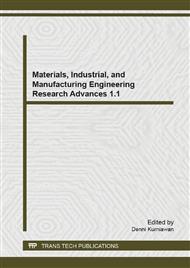[1]
MALAYSIA, Third Industrial Master Plan, " Ministry of International Trade and Industry, [Online]. Available: http: /www. miti. gov. my/cms/content. jsp, id=com. tms. cms. article. Article_81cde187-c0a81573-11c011c0-5bae8b76. [Accessed 28 May 2013].
Google Scholar
[2]
J. P. Womack, D. T. Jones and D. Roos, The Machine That Changed The World, New York: Harper Perennial, (1990).
Google Scholar
[3]
M. Taleghani, Key factors for implementing the lean manufacturing system, Journal of American Science, vol. 6, no. 7, pp.287-291, (2010).
Google Scholar
[4]
M. Scherrer-Rathje, T. A. Boyle and P. Deflorin, Lean, take two! Reflections from second attempt at lean implementation, Business Horizons, vol. 52, no. 1, pp.79-88, (2009).
DOI: 10.1016/j.bushor.2008.08.004
Google Scholar
[5]
L. Cheng and B. Meng, Why Most Chinese Enterprises Fail in Deploying Lean Production, Asian Social Science, vol. 6, no. 3, pp.52-57, (2010).
DOI: 10.5539/ass.v6n3p52
Google Scholar
[6]
J. P. Womack and D. T. Jones, Lean Thinking, Free Press, (1996).
Google Scholar
[7]
N. Nordin, B. M. Deros and D. A. Wahab, A Survey on Lean Manufacturing Implementation in Malaysian Automotive Industry, International Journal of Innovation, Management and Technology, pp.374-380, (2010).
Google Scholar
[8]
W. Y. Cheng, W. K. Yew and A. Ali, A study on lean manufacturing implementation in the Malaysian Electrical and Electronic Industry, European Journal of Scientific Research, vol. 38, no. 4, pp.521-535, (2009).
Google Scholar
[9]
S. Pavnaskar, J. Gershenson and A. Jambekar, Classification scheme for lean manufacturing tools, International Journal of Production Research, vol. 41, no. 13, pp.3075-3090, (2003).
DOI: 10.1080/0020754021000049817
Google Scholar
[10]
T. G. Bond and C. M. Fox, Applying the Rasch Model 2nd Edition, New York, London: Routledge, (2012).
Google Scholar
[11]
S. Masodi, Introduction to Rasch Model Analysis Workshop, Shah Alam: Universiti Teknologi Mara, (2013).
Google Scholar
[12]
U. Sekaran, Research Methods for Business: A skill building approach : Fourth Edition, Singapore: John Wiley and Sons, (2005).
Google Scholar
[13]
S. Masodi, Rasch Model Workshop, Bangi, January (2013).
Google Scholar
[14]
S. J. Warwood and G. Knowles, Emerald Article : An investigation into Japanese 5-S practice in UK industry, The TQM Magazine, vol. 16, no. 5, pp.347-353, (2004).
DOI: 10.1108/09544780410551287
Google Scholar
[15]
F. A. Abdulmalek, J. Rajgopal and K. L. Needy, A Classification Scheme for the Process Industry to Guide the Implementation of Lean, Engineering Management Journal, vol. 18, no. 2, pp.15-26, (2006).
DOI: 10.1080/10429247.2006.11431690
Google Scholar
[16]
U. Lehtinen and M. Torkko, The Lean Concept in the Food Industry: A Case Study of Contract a Manufacturer, Journal of Food Distribution Research, vol. 36, no. 3, pp.57-67, (2005).
Google Scholar
[17]
I. Dekic, Lean Manufacturing in Two Serbian Food Companies - Case Studies, International Journal of Quality Research, vol. 3, pp.657-663, (2012).
Google Scholar


